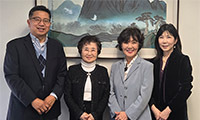Staff Reporter
Last week, 14 people were fined 10 million won each for posting abusive Internet messages about the death of a social activist’s son. The activist is Lim Soo-kyung.
In 1989, before the 2000 inter-Korean reconciliation, Lim, then a college student, visited the North and has since pursued various activities for reunification of the two Koreas.
When the news of the accidental death of Lim’s son broke on Internet in July, the accused people posted anonymous messages ridiculing the death. Some called Lim a `Red’.
Shockingly, a majority of the accused were men of high social status or education, including a university professor and finance expert.
They reportedly said that while they had nothing personal against Lim, they posted such comments as they needed a vicarious subject upon which to vent their anger toward the current North-friendly government.
On Monday police decided to punish Internet users who, last July, posted unfounded rumors regarding popular singer-and-actor Rain, saying he had confessed during a radio show of having had a sexual relationship with a female singer while speaking on the phone with another singer, without knowing that it was being broadcasted live.
As there was no truthful basis to the rumor police fined four of the accused.
It is not the first time that victims of a malicious cyber attack have taken legal action.
According to police, there were many cases of candidates during the 2004 general election accusing people of posting ``akpul’’ on Internet sites.
Akpul, is a term coined by Internet users by combining two words. `Ak’ is the Chinese character to mean evil or vicious, and `pul’ is the Koreanized pronunciation of the word `reply.’ Accordingly, it means an abusive and unreasonable reply for comments posted anonymously by Internet users in response to news stories.
For stars or public figures, it has been almost impossible to avoid akpul since they are always the subject of envy and gossip.
With the two incidents expected to warn ill-mannered Internet users, experts are looking for solutions to the abundance of akpul.
As for the cause of abusive messages on the Internet, experts say that the guaranteed anonymity and the current system of Internet portal sites easily lure users into expressing their raw feelings without second thought.
Song Kyong-jae, a researcher at Kyunghee University, said the current system attracts unwanted and unrefined comments.
``Thus, instead of having a sense of ownership or responsibility within the system, you come to rather just discharge your rough feelings and thoughts,’’ he said. ``Instead of allowing online postings below news stories, Internet portal sites should support more active online discussion on various social topics so that people can give reasonable opinions.’’
Jang Woo-young, a researcher at the social science institute with Sogang University, said since the Internet allows you to comment without facing the counterpart, the importance of manners and rules of conversation become much less significant. ``In contrast to offline space in which mass media plays a main role in communication, everyone gets their chance to speak out online. Such suppressed feelings and opinions in reality are being expressed in a form of angry, malicious replies on the Internet,’’ he said.
``Personally, I don’t read messages posted by anonymous readers below news stories because I know that most of them are trash. Regrettably enough, Lim must have been shocked when reading them as she took them seriously. She should have not read them at all in the first place,’’ said Hwang Sang-min, a professor of psychology at Yonsei University.
According to a recent poll by Internet portal sites, more than 68 percent of respondents agreed to legal action against those who make such angry replies.
However, they also point out that although akpul deserves to be blamed, it is not desirable to deal with them through legal means saying that such measures could reduce freedom of expression.
``Despite side effects, the Internet has opened a new era for active and horizontal communication. Considering that the strength of Internet culture lies in its democratic nature and openness, the most important thing here is that Internet users regulate themselves and exercise mature manners,’’ Jang said.
Under new policies to prevent akpul popular Internet portal sites such as Empas, Daum, Yahoo Korea and NHN have announced they will strengthen monitoring and disclose the IP (Internet Protocol) addresses of anonymous posters. They will reform the system so that when pressing an ID of a person who posts a new message regarding news stories, his or her previous messages can be seen, consequently preventing users from taking advantage of anonymity.
michelle@koreatimes.co.kr
스마터리빙
more [ 건강]
[ 건강]이제 혈관 건강도 챙기자!
[현대해운]우리 눈에 보이지 않기 때문에 혈관 건강을 챙기는 것은 결코 쉽지 않은데요. 여러분은 혈관 건강을 유지하기 위해 어떤 노력을 하시나요?
 [ 건강]
[ 건강]내 몸이 건강해지는 과일궁합
 [ 라이프]
[ 라이프]벌레야 물럿거라! 천연 해충제 만들기
 [ 건강]
[ 건강]혈압 낮추는데 좋은 식품
[현대해운]혈관 건강은 주로 노화가 진행되면서 지켜야 할 문제라고 인식되어 왔습니다. 최근 생활 패턴과 식생활의 변화로 혈관의 노화 진행이 빨라지고
카테고리 최신기사
- 4기 폐암 치료
- 뜨거운 ‘韓日 동맹 라인’ 이토 AS→김민재 골 ‘열도 홀렸다’... 일본 “콤파니 황태자들, 완벽히 해냈다” 찬사
- 마인츠, 하이덴하임 2-1 꺾고 ‘꼴찌 탈출’
- ‘환상 1호골+최고 평점’ 김민재 특급 맹활약, 뮌헨에서 가장 빛났다... ‘17G 무패’ 압도적 우승 페이스
- 이재성이 마인츠 살렸다! 2경기 연속 ‘미친 택배’ 도움... 마인츠, 하이덴하임 잡고 드디어 ‘꼴찌 탈출’
- 한국 U23 아시안컵 8강 상대 ‘호주’ 확정... 중국은 D조 2위 진출
- ‘낯설다’ 손흥민, 15년 만의 첫 ‘겨울 시즌’ 드디어 시작... ‘황제’ 메시와 맞대결도 ‘개봉박두’
사람·사람들
more
[화제] 유도 미 국가대표 3형제… “LA 올림픽 금메달 위해 구슬땀”
3형제가 나란히 미국 국가대표로 활약하고 있어 화제다. 조슈아 양(22·-60kg급), 제이콥 양(20·-66kg급), 조나단 양(18·-60…

연세대 남가주 동문회… “61주년 맞아 새로운 도약”
연세대학교 남가주 동문회 제50대 회장으로 취임한 권기숙 회장이 신임 회장단과 함께 본보를 방문해 향후 동문회 운영 방향과 비전을 밝혔다. 1…
LA 북부한인회, 글렌데일 시청서 ‘한인의 날’
LA 북부한인회(회장 박승목)는 미주 한인 이민 123주년 기념 ‘미주 한인의 날’을 맞아 지난 13일 글렌데일 시청에서 열린 한인의 날 선포…
‘전통 실크등의 아름다움’
LA 한국문화원이 경상남도 진주시와 함께 ‘한국의 빛: 진주 실크등 전시회’를 1월15일부터 2월28일까지 개최한다고 밝혔다. 이번 전시는 문…
코윈 퍼시픽 LA 신년회·이사장 취임식
세계한민족여성네트워크(KOWIN) 퍼시픽 LA 지부(회장 조미순)는 지난 7일 LA 용수산에서 신년회 및 이사장 취임식을 개최했다. 참석자들은…
많이 본 기사
- 트럼프, 새 건강보험 개혁안 발표… … 3
- 미네소타 시위에 ‘내란법’ 꺼내든 트럼프… ‘군 투입되나’ 긴장↑
- 항모보다 비싼 ‘트럼프급 전함’ 건조비용…220억 달러 전망
- 안보리서 美·이란 충돌… “모든 선택지 고려” vs “美 소요 개입”
- 李대통령 지지율 58%로 2%p↓…민주 41%·국힘 24%[한국갤럽]
- 靑 “이혜훈, 野서 5번 공천에 3번 의원…우리가 쓰겠다니 비판”
- 임시대통령 로드리게스 vs 트럼프 만난 마차도…혼란의 베네수 실권 다툼
- 대만, 美관세협상 긍정 평가… ‘5천억불’ 투자액은 쟁점 가능성
- “이란 공격시 정권붕괴 대신 분쟁 확산”…美당국, 트럼프에 보고
- KAPAC “공공외교로 한반도 평화 이끌어내겠다”
- 방미 일정 연기한 통상본부장, 美당국자·업계 만난 뒤 귀국길
- 백악관 “14일 발표한 반도체 관세는 1단계…추가발표 가능”
- 美日국방장관 회담…”제1도련선 전력 강화”·”대응력 제고”
- 베네수 야권지도자 마차도, 트럼프에 진품 노벨평화상 전달
- 트럼프, 반발시위 거세지는 미네소타에… 1
- 워싱턴 공공요금 줄줄이 인상
- NBA 이어 대학농구서도 경기조작… “더 큰 점수차로 져라”
- Trump Unveils New Healthcare Reform Plan: “Subsidies to Individuals Instead of Insurance Companies”
- [건강포커스] “GLP-1·DPP-4 계열 당뇨병 치료제, 치매 위험 낮춰”
- 美가 외면한 마차도, 베네수 운명 쥔 트럼프 면담… “대화 잘돼”
- ‘尹 내란 첫 결론’ 체포방해 오늘 1심 선고…TV 생중계
- 송성문 어떻게든 MLB 뛰게 한다 “3루·2루·1루에 심지어 외야까지 시도” 감독 확언
- 사기 피해 방지하려면… 시도 때도 없이 걸려오는 스팸 전화·문자 ‘심각’
- ‘40세’ 강은비, 임신 21주만 유산 “조기 양막 파열..子 보냈다”
- 무서운 ‘독감’… 한인 5세 아동 사망
- ‘환율·반미정서·고비용’ 미국 관광산업 ‘된서리’
- “트럼프 야욕 안꺾여”…덴마크·유럽 주요국, 그린란드에 파병
- 국적이탈 수속에 2년이나 걸리다니⋯ 2
- 연세대 남가주 동문회… “61주년 맞아 새로운 도약”
- ‘뉴진스 퇴출’ 다니엘, SNS 새 프로필 추가..본격 활동 개시?
- 뉴욕증시, 반도체는 좋은데 고점은 부담…상승 마감
- 주거 공간만으론 부족… 신체·정신적 건강까지 챙겨야
- 10억 vs 3000만 원..박나래·전 매니저, 합의서 공개 ‘입장차 극명’
- [화제] 유도 미 국가대표 3형제… “LA 올림픽 금메달 위해 구슬땀”
- 베네수 임시 대통령, 석유 분야 외국투자 촉진 개혁 예고
- 美자산운용사 블랙록, 운용자산 14조 달러 돌파…ETF가 성장주도
- 모기지 보험료 인하·다운페이… 올해 알아 둘 보조 프로그램
- 美, ‘반정부 시위 탄압’ 이란 당국자 제재…對이란 압박 높여
- 트럼프, ‘피난처’ 지자체에 “연방 … 1
- 주택가 공놀이에 벌금·징역까지? 3
- “한 나라 책임지는 사명 이어간다”
- LA “단속 요원 오지마” ‘ICE … 2
- 모기지 금리 인하와 주택 시장의 변곡… 1
- 엘리콧시티 지점 텔러 모집
- AI 시대, 한글 가치 세계로
- 한미수교 100주년 기념 조형물 재설치 가능성 보인다
- 방탄소년단 정규 5집 제목은 ‘아리랑’
- 美, 대만에 먼저 반도체관세 면제조건 제시…韓은 앞으로 협상
- BTS, 볼티모어 온다
- 뉴욕한인회‘제123주년 미주한인의 날’ 기념식 성황
1/5지식톡

-
 한국 안경을 무료 배송으로 받아보실…
0
한국 안경을 무료 배송으로 받아보실…
0안녕하세요. 서울 안암동에 위치한 ‘보고싶다 안경원’입니다.저희는 다년간 한국 고객분들께 착용감 좋은 안경테와 한국안경브랜드,고압축 도수 렌즈를 합리적인 가격에 제공해온 안경 전문점입니다.이번에 해외 배송이 가능해…
-
 미 육군 사관학교 West Poin…
0
미 육군 사관학교 West Poin…
0https://youtu.be/SxD8cEhNV6Q연락처:wpkapca@gmail.comJohn Choi: 714-716-6414West Point 합격증을 받으셨나요?미 육군사관학교 West Point 학부모 모…
-
 ☝️해외에서도 가능한 한국어 선생님…
0
☝️해외에서도 가능한 한국어 선생님…
0이 영상 하나면 충분합니다!♥️상담신청문의♥️☝️ 문의 폭주로 '선착순 상담'만 진행합니다.☎️ : 02-6213-9094✨카카오톡ID : @GOODEDU77 (@골뱅이 꼭 붙여주셔야합니다…
-
 테슬라 자동차 시트커버 장착
0
테슬라 자동차 시트커버 장착
0테슬라 시트커버, 사놓고 아직 못 씌우셨죠?장착이 생각보다 쉽지 않습니다.20년 경력 전문가에게 맡기세요 — 깔끔하고 딱 맞게 장착해드립니다!장착비용:앞좌석: $40뒷좌석: $60앞·뒷좌석 …
-
 식당용 부탄가스
0
식당용 부탄가스
0식당용 부탄가스 홀세일 합니다 로스앤젤레스 다운타운 픽업 가능 안녕 하세요?강아지 & 고양이 모든 애완동물 / 반려동물 식품 & 모든 애완동물/반려동물 관련 제품들 전문적으로 홀세일/취급하는 회사 입니다 100% …
케이타운 1번가
오피니언
 한 영 재미수필가협회 회장
한 영 재미수필가협회 회장 [한영의 독서칼럼] 햇살을 향해 헤엄치기
 이규민 한식진흥원 이사장
이규민 한식진흥원 이사장 [로터리] 시간을 담그는 문화, 한국의 장
 이상훈 서울경제 정치부장
이상훈 서울경제 정치부장 [여명] 망국병 ‘진영 논리’
 허경옥 수필가
허경옥 수필가 [윌셔에서] 숲의 숨으로
 이영태 / 한국일보 논설위원
이영태 / 한국일보 논설위원 [지평선] 조롱받는 72만 ‘쉬었음 청년’

[왈가 왈부] 김경·강선우 뒷북 출금… ‘수사 뭉개기’ 의심 살 만하네요
 정숙희 논설위원
정숙희 논설위원새로 나온 이상한 식품 피라미드
 데이빗 이그나티우스 워싱턴포스트 칼럼니스트
데이빗 이그나티우스 워싱턴포스트 칼럼니스트 [데이빗 이그나티우스 칼럼] 그린란드에 대한 트럼프의 위험한 집착
 김동찬 시민참여센터 대표
김동찬 시민참여센터 대표 [미국은 지금] 침팬지의 그루밍과 인간의 민주주의
1/3지사별 뉴스

뉴욕한인회‘제123주년 미주한인의 날’ 기념식 성황
뉴욕한인회(회장 이명석)가 13일 맨하탄 뉴욕한인회관에서 개최한‘제123주년 미주한인의 날’ 기념 행사가 각계에서 활동 중인 1.5세 및 2세…
국적이탈 수속에 2년이나 걸리다니⋯

연방의회서 “한인 위상·한미동맹 제고” 한목소리
한인 이민자들이 미국에 도착한 123주년을 기념하고 한인들의 미국 사회에의 기여를 알리는 ‘제 21회 미주 한인의 날’ 행사가 13일 연방의회…
한국학교 방향성 재정립 모색

한미수교 100주년 기념 조형물 재설치 가능성 보인다
샌프란시스코 공원에 설치되어 있다 철거되어 창고에 보관중인 한미수교 100주년 기념 조형물이 다시 설치될 가능성이 열렸다.한국 국회 재정경제기…
재미한국학교협의회

오늘 하루 이 창 열지 않음 닫기 


















































.png)


댓글 안에 당신의 성숙함도 담아 주세요.
'오늘의 한마디'는 기사에 대하여 자신의 생각을 말하고 남의 생각을 들으며 서로 다양한 의견을 나누는 공간입니다. 그러나 간혹 불건전한 내용을 올리시는 분들이 계셔서 건전한 인터넷문화 정착을 위해 아래와 같은 운영원칙을 적용합니다.
자체 모니터링을 통해 아래에 해당하는 내용이 포함된 댓글이 발견되면 예고없이 삭제 조치를 하겠습니다.
불건전한 댓글을 올리거나, 이름에 비속어 및 상대방의 불쾌감을 주는 단어를 사용, 유명인 또는 특정 일반인을 사칭하는 경우 이용에 대한 차단 제재를 받을 수 있습니다. 차단될 경우, 일주일간 댓글을 달수 없게 됩니다.
명예훼손, 개인정보 유출, 욕설 등 법률에 위반되는 댓글은 관계 법령에 의거 민형사상 처벌을 받을 수 있으니 이용에 주의를 부탁드립니다.
Close
x